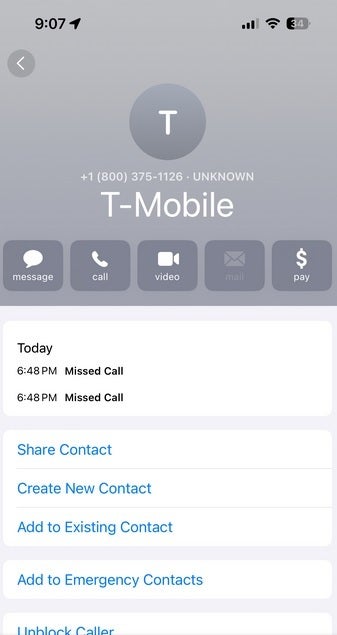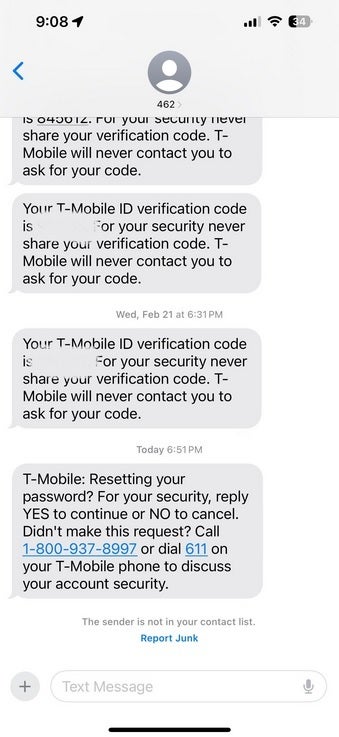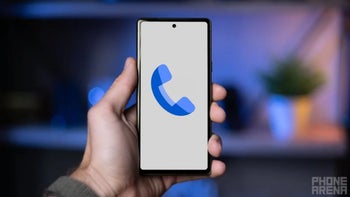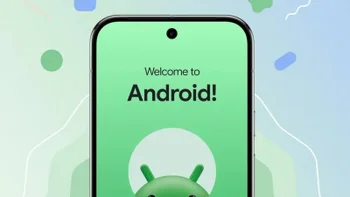T-Mobile subscribers need to watch out for this scam which could wipe you out quickly

A T-Mobile subscriber detailed a scam call he received recently that might have ensnared some other subscribers to the nation's second-largest carrier. Redditor mgahs described the whole incident which started with an incoming call from T-Mobile that caller ID identified as a legit T-Mobile number (1-800- 375-1126). The first two times he received the call, he sent it to voicemail. Since he was watching a movie with his kids, he decided to pick up the call the third time they called.
When he picked up the phone on the third call, the voice on the other end said, "We're calling because someone ordered two iPhone 15 Pro Max phones on your account but then changed the billing address on the account and we wanted to confirm before processing the order." The T-Mobile subscriber said he hung up immediately. Meanwhile, at this stage of the incident, he has three reasons to be suspicious:
- Multiple phone calls back-to-back-to-back.
- Nobody ordered any phones on his account, nor did he receive any emails, alerts, or text messages saying so.
- Who changes a BILLING ADDRESS when trying to order phones on someone else's account?
Right away, the scammer calls back and when the intended victim explains that he didn't order any new phones, the scammer on the other end of the line says, "Okay, we need to reset the password on your T-Mobile account. I'm going to send you a text message, and I need you to respond "YES" to the text, then read me back the code it provides you."
Always be suspicious of calls that appear to come from your wireless provider
Unbeknown to the scammer, the target has already reset his T-Mobile password. He eventually goes on to tell the caller this, but the caller, still going through with the charade of being a T-Mobile rep, says that the password needs to be changed by him. Another suspicious act.

Although Called ID identifies this call as coming from T-Mobile, it was a scam call
Now, our hero receives a text from 462, which matches a number that he has seen before when receiving codes texted to him from T-Mobile. The message says, "T-Mobile: Resetting your password? For your security, reply YES to continue or NO to cancel. Didn't make this request? Call 1-800-937-8997 or dial 611 on your T-Mobile phone to discuss your account security." The person on the other end of the call insists that the T-Mobile subscriber type YES and type in the code he received.
As he points out, this is yet another suspicious action: A prior legitimate T-Mobile text once said, "For your security never share your verification code. T-Mobile will never contact you to ask for your code." Now, here is this this fake T-Mobile rep demanding the code. That is a big red flag So with the realization that the call is fake, he types YES anyway, receives a code, and then makes up a different code to tell the scammer who says that the account is now locked down. "I immediately hang up, block the number, and call 611, says the T-Mobile subscriber."
The intended victim is connected to a real T-Mobile rep and after discovering that no one ordered an iPhone on his account since he opened his T-Mobile account, he explained what had just happened and the real T-Mobile rep took down the info. Our hero had the intelligence to smell out the scheme and understand that something was wrong. Had he not been suspicious, he could have had his bank account cleaned out.
Don't be afraid to call the carrier to confirm any suspicious behavior
Our hero also has some parting words to live by. "So, word of warning for everyone: if it smells rotten, it probably is. Don't be afraid to disconnect, and call 611 yourself to confirm any suspicious account behaviors."

A fake text is sent to the intended victim hoping to get him to reveal some information
The scary part is that the scammer was able to make it appear as though his call was coming from a phone number associated with T-Mobile. Recently we told you about a scam involving a large number of fake notifications that look as though they were sent by Apple that was followed up by a phone call spoofed to make it look as though it was coming from Apple Support. The caller tells you that there is an issue with your phone or account, and he will send you a code to read back.
DO NOT DO IT!!! Thanks to a bug with the password reset feature used with the Apple ID password, if you read back the code that is sent to you, the scammer will be able to erase your Apple ID password, replace it with his own, and take over your phone and the apps on your phone. Be suspicious of everything!
Follow us on Google News













Things that are NOT allowed:
To help keep our community safe and free from spam, we apply temporary limits to newly created accounts: